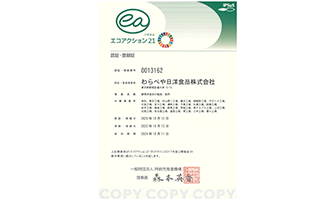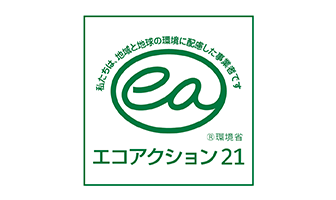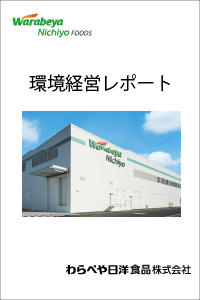Eco Action 21 is a unique Japanese environmental management system (EMS) devised by Japan’s Ministry of the Environment. Based on a method for continuously improving performance, typically called a PDCA cycle, Eco Action 21 specifies methods by which organizations, business operators, and others can voluntarily undertake environmental initiatives.
As the main operating company of the Group, Warabeya Nichiyo Foods Co., Ltd. (formerly Warabeya Nichiyo Co., Ltd.), acquired Eco Action 21 certification and registration for all of our domestic plants in October 2020 in an effort to strengthen our environmental measures, including those for saving energy, conserving resources, and reducing waste.
We will fulfill our responsibilities as a member of society by further strengthening the environmental awareness of each and every employee, and by continuing to engage in these efforts.


The Group has set forth environmental management targets and published them in the Environmental Management Report since 2020. This report provides details on the following initiatives.
- Reducing CO₂ through electric power
- Reducing CO₂ through fuels
- Reducing CO₂ through automobile fuels
- Reducing water usage
- Reducing general waste
- Reducing industrial waste (plastic waste)
- Reducing animal and plant residues*
- Increasing the food waste recycling rate
Eco Action 21: Environmental Management Report
*Animal and plant residue: Refers to unwanted solids from animals and plants used as ingredients. Specific examples include animal and fish bones, egg shells, vegetable scraps, etc.
|
Item |
Unit |
2021 |
2022 |
|
Total carbon dioxide emissions |
t-CO₂ |
113,804 |
110,176 |
|
Waste Amounts |
|||
|
General waste |
t |
984 |
961 |
|
Industrial waste |
t |
25,408 |
8,454 |
|
Food waste |
|||
|
Amount generated |
t |
12,882 |
12,138 |
|
Amount avoid |
t |
2,973 |
3,719 |
|
Amount recycled |
t |
12,800 |
12,028 |
|
Heat recovery |
t |
0 |
0 |
|
Amount reduced |
t |
0 |
0 |
|
Non-recycled amount |
t |
0 |
0 |
|
Amount of discarded waste |
t |
81 |
110 |
|
Food recycling etc. implementation rate |
% |
99 |
99 |
|
Food recycling etc. standard implementation rate |
% |
99 |
99 |
|
Total wastewater volume |
thousand m³ |
4,614 |
4,438 |
*Carbon dioxide emissions factor 0.443kg-CO₂/kWh
*Each plant was assessed using the substitute values published in 2022 by the Ministry of the Environment and by the Ministry of Economy, Trade and Industry
|
Item |
2021 |
2022 |
Per unit (t-CO₂/1 million yen) |
|||||
|
2022 |
2023 |
2024 |
||||||
|
Base |
Target |
Results |
Evaluation |
Results |
Target |
Target |
||
|
Electric power reduced |
t-CO₂ |
62,139 |
61,518 |
63,980 |
× |
0.420 |
0.416 |
0.411 |
|
Base/Results comparison |
- |
99% |
103% |
- |
99% |
98% |
||
|
Fuels reduced (city gas, LPG, heavy oil, etc.) |
t-CO₂ |
50,996 |
50,486 |
45,358 |
〇 |
0.298 |
0.295 |
0.292 |
|
Base/Results comparison |
- |
99% |
88.9% |
- |
99% |
98% |
||
|
Automobile fuels reduced |
t-CO₂ |
669 |
662.3 |
838 |
× |
0.005 |
0.005 |
0.005 |
|
Base/Results comparison |
- |
99% |
125.3% |
- |
99% |
98% |
||
|
Total carbon dioxide emissions |
t-CO₂ |
113,804 |
112,666 |
110,176 |
- |
0.723 |
0.716 |
0.708 |
|
Water usage reduced |
thousand m³ |
4,399 |
4,355 |
4,438 |
× |
0.029 |
0.029 |
0.029 |
|
Base/Results comparison |
- |
99% |
100.9% |
- |
99% |
98% |
||
|
General waste reduced |
t |
984 |
974 |
961 |
〇 |
0.006 |
0.006 |
0.006 |
|
Base/Results comparison |
- |
99% |
97.7% |
- |
99% |
98% |
||
|
Plastic waste reduced |
t |
7,678 |
7,601 |
8,152 |
× |
0.053 |
0.053 |
0.052 |
|
Base/Results comparison |
- |
99% |
106.2% |
- |
99% |
98% |
||
|
Animal and plant residues reduced |
t |
11,210 |
11,098 |
11,210 |
× |
0.074 |
0.073 |
0.072 |
|
Base/Results comparison |
- |
99% |
100% |
- |
99% |
98% |
||
|
Food waste recycling rate |
Base/Results comparison |
99% |
99% |
99% |
〇 |
- |
99% |
99% |
|
Chemical substance usage reduced |
Proper management |
|||||||
|
Environmentally-friendly production activities |
Give consideration to the environment by reducing defects and by improving the efficiency of work processes |
|||||||
